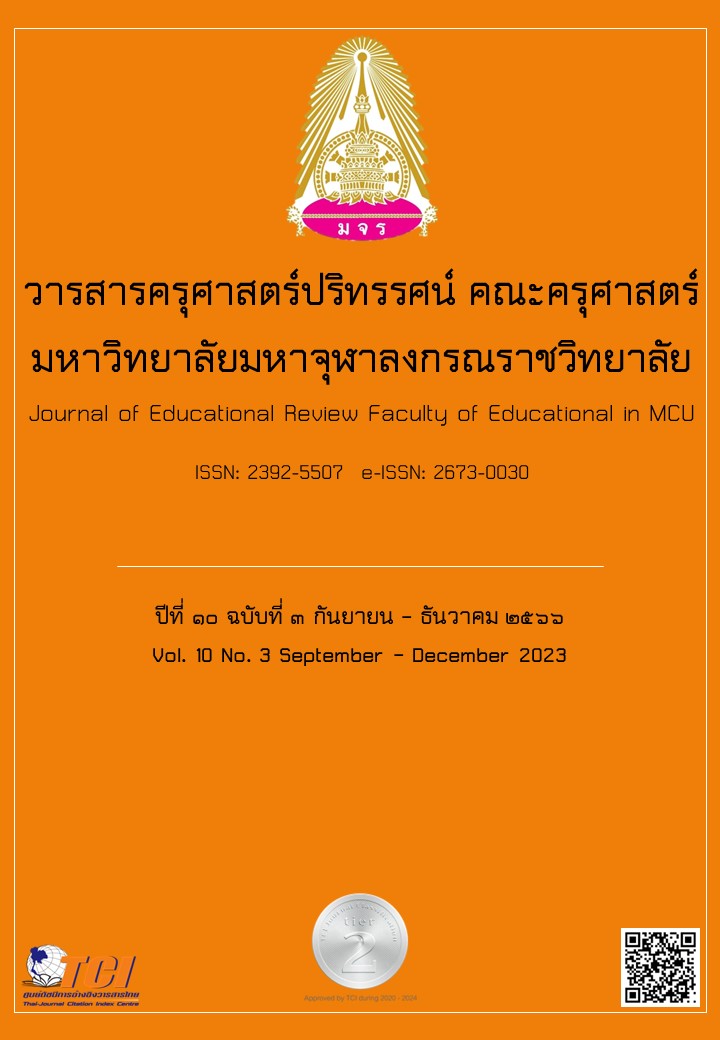THE NEEDS FOR DEVELOPING HORWANG SCHOOL TEACHERS BASED ON THE CONCEPT OF TEACHER LEADERSHIP
Main Article Content
Abstract
This research aimed to investigate the requirements for the development of teachers at Horwang School, based on the concept of teacher leadership. The research methodology used in this study was descriptive research. The population for the study consisted of Horwang School, with 1 school director and 4 deputy school directors providing the data, totaling 5 individuals. Additionally, 216 teachers from Horwang School were included in the research, selected using simple random sampling, resulting in a sample size of 134 teachers, making a total of 139 participants. The research instrument used was a questionnaire on the current state and desired state of teacher development at Horwang School, based on the concept of teacher leadership. The statistical analysis included frequency distribution, percentages, mean, standard deviation, necessity index analysis, preferences, and content analysis. The research findings indicate the following requirements for the development of teachers at Horwang School, based on the concept of teacher leadership: The highest level of necessity is related to leaders of change (PNImodified = 0.19), followed by leaders in professional development and collaboration (PNImodified = 0.14). Additionally, leaders in student development and effective teaching (PNImodified = 0.12) and leaders in self-development (PNImodified = 0.11) are also considered necessary.
Article Details

This work is licensed under a Creative Commons Attribution-NonCommercial-NoDerivatives 4.0 International License.
ทัศนะและความคิดเห็นที่ปรากฏในบทความในวารสารฉบับนี้ถือเป็นความรับผิดชอบของผู้เขียนบทความนั้นเพียงผู้เดียว และไม่ถือเป็นทัศนะและความรับผิดชอบของกองบรรณาธิการ
กองบรรณาธิการขอสงวนสิทธิ์ในการคัดเลือกบทความลงตีพิมพ์และจะแจ้งให้เจ้าของบทความทราบหลังจากผู้ประเมินบทความตรวจอ่านบทความแล้ว
ต้นฉบับที่ได้รับการตีพิมพ์ในวารสารครุศาสตร์ปริทรรศน์ คณะครุศาสตร์ มหาวิทยาลัยมหาจุฬาลงกรณราชวิทยาลัย ถือเป็นกรรมสิทธิ์ของคณะครุศาสตร์ มหาวิทยาลัยมหาจุฬาลงกรณราชวิทยาลัย ห้ามนำข้อความทั้งหมดหรือบางส่วนไปพิมพ์ซ้ำ เว้นเสียแต่ว่าจะได้รับอนุญาตจากมหาวิทยาลัยฯ เป็นลายลักษณ์อักษร
References
จรุณี แสงหวัง และธีร หฤทัยธนาสันติ์. (2563). ภาวะผู้นำครูไทย: การปรับแนวคิดตะวันตกให้สอดคล้องกับบริบทการศึกษาไทย. Journal of Information and Learning. 31(2). 70-81.
ยุทธศาสตร์ชาติ 20 ปี (พ.ศ. 2561-2580). (2561). ราชกิจจานุเบกษา. เล่ม 135 ตอนที่ 82ก. หน้า 30-36. (วันที่ 13 ต.ค. 2561)
โรงเรียนหอวัง. (2565). แผนปฏิบัติการประจำปีงบประมาณ พ.ศ. 2565. กรุงเทพมหานคร: โรงเรียนหอวัง.
วีระยุทธ แสงไชย (2564). ภาวะผู้นำครูที่ส่งผลต่อประสิทธิผลการบริหารงานวิชาการของโรงเรียนสังกัดสำนักงานเขตพื้นที่การศึกษาประถมศึกษาสกลนคร เขต 1. วิทยานิพนธ์ครุศาสตรมหาบัณฑิต. มหาวิทยาลัยราชภัฏสกลนคร.
ศุภวรรณ รูปงาม. (2563). ความสัมพันธ์ระหว่างภาวะผู้นำการเปลี่ยนแปลงกับประสิทธิผลการบริหารงานบุคคลของผู้บริหารโรงเรียน สังกัดสำนักงาน เขตพื้นที่การศึกษามัธยมศึกษา เขต 21. วิทยานิพนธ์ครุศาสตรมหาบัณฑิต. มหาวิทยาลัยราชภัฏสกลนคร.
สำนักงานเลขาธิการสภาการศึกษา. (2560). แผนการศึกษาแห่งชาติ พ.ศ. 2560 - 2579. กรุงเทพมหานคร: พริกหวานกราฟฟิค.
สำนักงานสภาพัฒนาการเศรษฐกิจและสังคมแห่งชาติ. (2564). กรอบแผนพัฒนาเศรษฐกิจและสังคมแห่งชาติ ฉบับที่ 13. แหล่งที่มา https://www.ldd.go.th/PDF/DevelopmentPlan สืบค้นเมื่อ 28 พ.ค. 2566.
Avolio, B. J., & Yammarino, F. J. (2013). Transformational and charismatic leadership: The road ahead. Emerald Group Publishing.
Bass, B. M., & Riggio, R. E. (2006). Transformational leadership. New York, NY: Psychology Press.
Bellibaş, M. Ş., Gümüş, S., & Kılınç, A. Ç. (2020). Principals supporting teacher leadership: The effects of learning‐centred leadership on teacher leadership practices with the mediating role of teacher agency. European journal of education. 55(2). 200-216.
Burns, J. M. (2012). Leadership. Open Road Media. From https://shorturl.asia/HKhFe Retrieved June 1, 2023.
Delgado, D., Hill, N., Regalado, A., & Waldman, N. (2020). Millennials leading the workforce. Journal of Business Studies Quarterly. 10(2). 35-42.
Ding, Z., & Thien, L. M. (2022). Assessing the antecedents and consequences of teacher leadership: a partial least squares analysis. International Journal of Leadership in Education. 5. 1-23.
Firestone, W. A., & Martinez, M. C. (2009). Districts, teacher leaders, and distributed leadership. Distributed leadership according to the evidence.
Gülmez, D. (2022). Teacher leadership and the Turkish context: the impact of the structural characteristics of the school and teacher leadership culture. International Journal of Educational Management. 36(4). 515-526.
Katzenmeyer, M., & Moller, G. (2009). Awakening the sleeping giant: Helping teachers develop as leaders. Corwin Press.
Kayrooz, C., & Fleming, M. (2008). Distributed leadership: Leadership in context. UNESCOAPEID International Conference, Bangkok.
Krejcie, R. V., & Morgan, D. W. (1970). Determining sample size for research activities. Educational and psychological measurement. 30(3). 607-610.
LaCore, E. (2015). Supporting millennials in the workplace. Strategic HR Review.
Leithwood, K., Louis, K. S., Wahlstrom, K., Anderson, S., Mascall, B., & Gordon, M. (2010). How Successful Leadership Influences Student Learning: The Second Installment of a Longer Story. In Second International Handbook of Educational Change.
Li, L., & Liu, Y. (2022). An integrated model of principal transformational leadership and teacher leadership that is related to teacher self-efficacy and student academic performance. Asia Pacific Journal of Education. 42(4). 661-678.
Marzano, R. J., Waters, T., & McNulty, B. A. (2001). School leadership that works: From research to results. ASCD.
Neuman, M., & Simmons, W. (2000). Leadership for student learning. Phi Delta Kappan. 82(1). 9-12.
Onorato, M., Walsh, L., & Lei, Y. (2018). Millennials: Effective leaders of the future. Academy of Business Research Journal. 2. 22-35.
Oppi, P., Eisenschmidt, E., & Jõgi, A.-L. (2022). Teacher’s readiness for leadership–a strategy for school development. School leadership & management. 42(1). 79-103.
Sergiovanni, T. J. (2005). The virtues of leadership. The educational forum.
Shen, J., Wu, H., Reeves, P., Zheng, Y., Ryan, L., & Anderson, D. (2020). The association between teacher leadership and student achievement: A meta-analysis. Educational Research Review. 31. https://doi.org/10.1016/j.edurev.2020.100357
Wang, Q., Lee, K. C. S., & Hoque, K. E. (2022). The mediating role of classroom climate and student self-efficacy in the relationship between teacher leadership style and student academic motivation: evidence from China. The Asia-Pacific Education Researcher. 1-11.
Webber, C. F., & Okoko, J. M. (2021). Exploring teacher leadership across cultures: Introduction to teacher leadership. Research in Educational Administration and Leadership. 6(1). 1-15.
York-Barr, J., & Duke, K. (2004). What do we know about teacher leadership? Findings from two decades of scholarship. Review of educational research. 74(3). 255-316.


